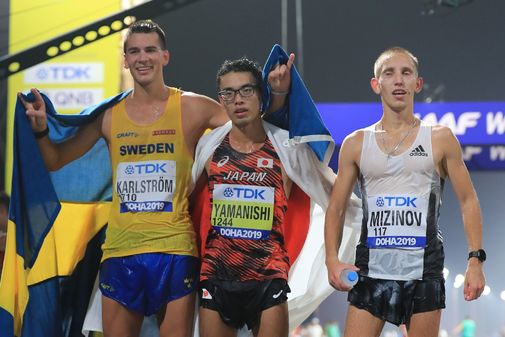The thermometer operated by the International Athletics Federation (IAAF), an orange device on a tripod, indicates that competing in this way is inhuman, a risk. In full male test of the 20 kilometers march of the World Cup shows 34 degrees, 88% humidity and more than 32 degrees of wet bulb temperature, a standard to analyze these situations. According to the World Health Organization (WHO), running at more than 28 degrees is dangerous to health and doing so at more than 31 degrees is impossible, a race in these conditions should be canceled, but we are in Doha and here they have paid for this . "The conditions outside the stadium are being extreme, but there have never been so many medical assistance and we have not suffered any serious health problems," said Sebastian Coe , president of the IAAF, a few hours of playing Russian roulette again with the athletes . As in the women's marathon, there was another concatenation of fainting and poor performance because the goal of many was to survive.
The Spanish, for example, were content to finish. At kilometer three, Miguel Ángel López got carried away ; in the five, Diego García ; and in the eight, Álvaro Martín , European champion last year. In the equator of the race none of them was in the group of favorites and, while their coaches confirmed the disaster, the entire team lamented. In any World Cup, Spain depends on the march and now it is in a bad streak. After giving the team 17 of his 38 medals - among them, three of his seven golds -, he has two editions without podiums in an unprecedented void. Two years ago, in London, the fiasco was justified in the generational change that the team was experiencing, with young people like Martín or García in full progression, but this time the zero hurt.
In their rivalry with the Asians, the marchers of China or Japan, the meteorological conditions gave them a very important advantage and, despite the concentrations in half the world, despite the days in the temperature chamber that the Air Force has in Torrejón , the comeback was impossible. There is no place in Spain where you can train in so much humidity and, of course, no one in Spain has been born, has been trained and prepared under these conditions. As it happened in the 20 kilometers of women and 50 kilometers, you could only see the Japanese from afar and applaud their exhibition.
The winner was Toshikazu Yamanishi at 1:26:34, a record almost 10 minutes higher than his best mark of the season, followed by Russian Vasiliy Mizinov and Swede Perseus Kalstrom . After them we had to wait a long time for the Spaniards to enter the finish line and when they did they did it undone: Martin finished 21st, almost seven minutes from the champion; Lopez was 25th and Diego Garcia, who touched the abandonment, finished 34th, almost 15 minutes from Yamanishi.
When they arrived they just wanted to cry. "I don't know what has failed. I had prepared a lot for these conditions, but I found myself missing from the second kilometer," Garcia commented in tears.
According to the criteria of The Trust Project
Know more- sports
- more sport
World AthleticsFraser-Pryce, the Jamaican queen of the 'sprint', takes gold in the 100 meters
Athletics World Championship The sequels of the women's marathon: "It ran beyond the limit"
Athletics The IAAF awards the bronze to Orlando Ortega for a desperate resource in Spain

